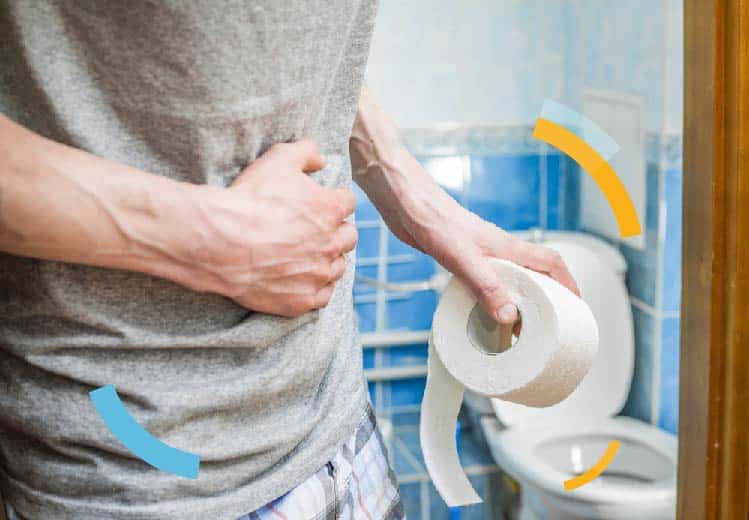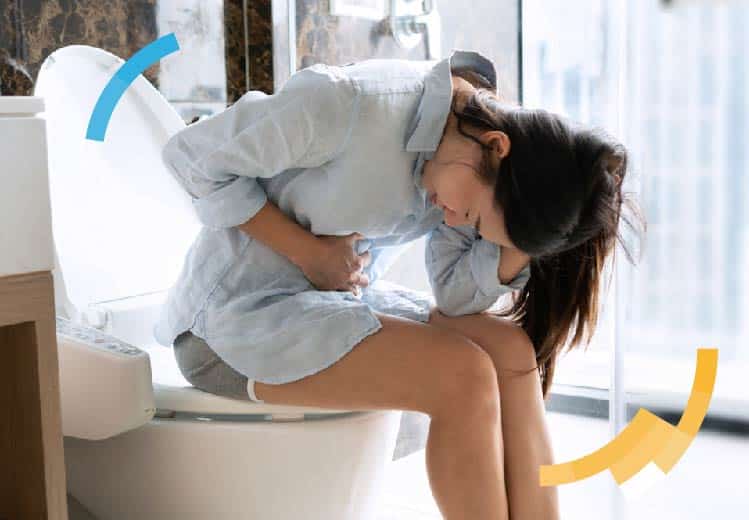
Dr. Kao Myat Kyi
Medically Reviewed

Diarrhea may not be the most presentable subject to talk about, but unfortunately it is a common digestive disorder that everyone is likely to experience at some point. Luckily it is usually nothing to worry about, but can be unpleasant until it ends. Let’s find out, what causes diarrhea and how you can treat it from home…
What is Diarrhea?
Diarrhea is the passing of looser and more frequent stools than normal to you. The symptoms normally don’t last longer than a few days, but it can cause irritation, and dehydration from losing water in your poo.
Some people experience additional symptoms, including stomach cramps, bloated stomach, nausea and vomiting, and loss of appetite.
Due to the nature of the loss of water in your stool, dehydration can occur if not recognised and treated quickly. That is why it is important to have lots of fluids.
Signs of dehydration in children differ from adults.
The symptoms of dehydration in children include:
- cold hands and feet
- passing urine irregularly
- drowsiness and irritability
- looking increasingly unwell.
The symptoms of dehydration in adults include:
- loss of appetite
- dizziness
- dry tongue
- sunken eyes
- muscle cramps
- rapid heartbeat
- lack of energy
- nausea
Diarrhea can happen all over the world, but in Thailand, diarrhea is very common especially amongst travelers when they are trying new foods as they are exposed to new bacteria that their body hasn’t had the chance to acquire immunity from yet.
What Causes Diarrhea?
Diarrhea has a number of different causes, but gastroenteritis is a common cause.
Gastroenteritis can be caused…
- by bacteria, such as E.coli, usually found in contaminated food,
- by a parasite, such as giardiasis, spread in contaminated water
- by viruses, such as norovirus or rotavirus
Additional causes of diarrhea include, food allergies, medication, anxiety or long-term diseases such as crohn’s or irritable bowel syndrome (IBS).

How to Treat Diarrhea?
If you have a mild case of diarrhea, you can treat yourself at home. The most important thing is to stay hydrated by taking on board a lot of fluid drinks such as water- small and frequent sips. Avoid fruit juice and fizzy drinks which may make diarrhea worse. It is extremely important that babies and children are hydrated. In some cases, the pharmacist will suggest re-hydration solutions.
If you’re not feeling sick then try to eat mild food as soon as you feel comfortable. If you feel any discomfort then you should stay at home and get plenty of rest.
If a baby has diarrhea then you should carry breast or bottle feeding supplies and give small feeds more often to keep them hydrated. If the baby is given formula or solid food then make sure you give them a sip of water between meals, but there’s no need to make the formula weaker than usual.
What to Eat or Not to Eat When You Have Diarrhea?
It is hard to eat or drink when you have diarrhea, but we recommend that you try to take a sip of water as often as possible to ensure that you won’t get severely dehydrated. On the first few days try to eat bland food such as unseasoned crackers or rice porridge to give your stomach time to heal.
Some Probiotic food can help with digestion by improving the balance of good and bad bacteria in the gut, dairy products can irritate the digestive system, so you can try non-dairy sources of probiotics, such as miso or sauerkraut.
Make sure you avoid savoury food and high fibre food. Fibre helps keep the digestive system active. Usually, this is a good thing, but when the body is trying to recover from diarrhea, fibre may make symptoms worse.
When Should You See the Doctor?
You should visit your doctor immediately if you have any of these symptoms:
- Blood in your stools
- Dark urine which indicate that you are dehydrated
- High fever that lasts more than 24 hours
- Diarrhea lasts longer than 2 days
- Nausea or throwing up that prevents you from drinking liquids to replace lost fluids
- Rapid heart rate
- Confusion
- Severe pain in abdomen
- Diarrhea after returning from a foreign country
Is it Infectious?
It is important to stay at home for 48 hours after your last episode of diarrhea as it can help prevent the spreading of infection to other people around you.
How to Prevent it?
If you are in a high-risk area such as Asia, you can prevent it by selecting what you eat or drink. Make sure you eat food that has been well-cooked and avoid raw foods, unwashed fruit and vegetables. You should drink bottled water, or beverages that are made from boiled water to ensure you get a clean drink.
Basic sanitary such as always cleaning your hands, stay hydrated and consume natural probiotics or activated charcoal.
Diarrhea, can be a temporary thing, or it can signal something more serious. Make sure you’re protected from the risks by ensuring you have comprehensive health insurance, to cover you in times of need.




